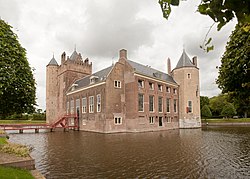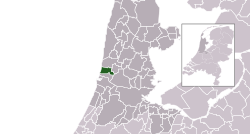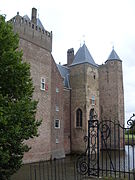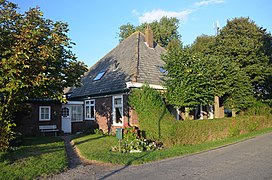Heemskerk
This article needs additional citations for verification. (July 2024) |
Heemskerk | |
|---|---|
 Assumburg castle in Heemskerk | |
 Location in North Holland | |
| Coordinates: 52°31′N 4°40′E / 52.517°N 4.667°E | |
| Country | Netherlands |
| Province | North Holland |
| Region | Amsterdam metropolitan area |
| Government | |
| • Body | Municipal council |
| • Mayor | K. S. Heldoorn (Labour Party) |
| Area | |
• Total | 31.68 km2 (12.23 sq mi) |
| • Land | 27.34 km2 (10.56 sq mi) |
| • Water | 4.34 km2 (1.68 sq mi) |
| Elevation | 2 m (7 ft) |
| Population (January 2021)[4] | |
• Total | 39,191 |
| • Density | 1,433/km2 (3,710/sq mi) |
| Demonym | Heemskerker |
| Time zone | UTC+1 (CET) |
| • Summer (DST) | UTC+2 (CEST) |
| Postcode | 1960–1969 |
| Area code | 0251 |
| Website | www |
Heemskerk (Dutch pronunciation: [ˈɦeːmskɛr(ə)k] ⓘ or [ɦeːmsˈkɛr(ə)k])[5] is a municipality and a town in the Netherlands, in the province of North Holland. It is located in the Kennemerland region.
History
[edit]The town was formed during the Middle Ages. In an official deed from the year of 1063, the town was known as Hemezen Kyrica, Latinized Frisian meaning Church of Hemezen, a Frisian nun who lived in a religious house there. Heemskerk knows many historical monuments, among them the Huldtoneel (lit. the "Inaugurate Stage"), an artificial hill located near the current Rijksstraatweg, where once the Counts of Holland were inaugurated. According to tradition, the Huldtoneel was used before the Roman Era as a Germanic sanctuary. In the nineteenth century Jonkheer Gevers finally made the Huldtoneel a monument – as it is known today – and ordered passers-by to honour the monument.
Many battles have been fought in Heemskerk. Two castles—Oud Haerlem Castle and Heemskerk Castle—were built in the twelfth and thirteenth century respectively to protect the County of Holland against the West Frisians. In the fifteenth century the residents of Heemskerk fought each other during the Hook and Cod wars, in which both castles were destroyed. The Oud Haerlem castle was never rebuilt, Castle Heemskerk however was. In 1492, a rebellion by the people of Kennemerland was brutally beaten down by the Austrian conquerors, on the place where today the cemetery of the Hervormde Kerk (Reformed Church) is located.


In 1610, the Castle Heemskerk was renamed to Castle Marquette and was at first the residence for many nobles and later inhabited by patricians. The last noble family that lived there were the House of Gevers. Today Castle Marquette is owned by the Spanish hotelgroup NH Hoteles and is the site of many weddings, conferences, and company courses, while the estate grounds are favoured for wedding photos.
Located on the eastside of Heemskerk is Castle Assumburg, built from the remains of Kasteel Oud Haerlem in 1546. The Nederlandse Hervormde Kerk (Dutch Reformed Church) at the Nielenplein and Kerkplein is built in 1628, but it has a tower from the Middle Ages. In the graveyard around the church is a copy of a monument dedicated to the father of painter Maarten van Heemskerck. The original is located inside the church.
Agricultural village
[edit]
After the time of knights and nobles, Heemskerk remained a small, quiet village near the dunes. Its residents, who mainly worked in agriculture and keeping cattle, had good, but also some very bad times. From the time that products—mainly strawberries for the neighbouring town Beverwijk, where the fruits were sold—were brought to the market with donkeys, people from Heemskerk got the name of Donkey as a nickname and symbol.
The former town hall was built in 1911 after a design by Jan Stuyt and was raised with an additional floor in 1949. Today this is the building where Janssen's notary office is located. The Roman Catholic Laurentiuskerk, designed by architect J. H. Tonnaer, was completed in 1891 and is a rare example of a Catholic church in Holland in a neo-renaissance style. There is nothing left of other historical monuments, like Castle Oud Haerlem.
Transportation
[edit]- Railway Station: Heemskerk
Notable residents
[edit]- André Aptroot (born 1961), mycologist and lichenologist
- Sofie van den Enk (born 1980), TV presente
- Bette Franke (born 1989), model
- Maarten van Heemskerck (1498–1574), portrait and religious painter
- Rolf de Heer (born 1951), Dutch-Australian film director
- Nicholaas Hennemann (1813–1898), photographer
- Rolf de Heer (born 1951), Dutch Australian film director
- Nico Roozen (born 1953), economist
Sportspeople
[edit]- Martin van der Horst (born 1965), volleyball player
- Ernesto Hoost (born 1965), kickboxer
- Sepp Koster (born 1974), racing driver
- Nick Kuipers (born 1988), footballer
- Dennis Lens (born 1977), badminton player
- Arthur Numan (born 1969), footballer
- Rafael van der Vaart (born 1983), footballer and darts player
- Juan Viedma (born 1974), footballer
Gallery
[edit]-
Kasteel Assumburg
-
Heemskerk, former town hall at the Burg. Nielenplein
-
Maerten van Heemskerck Statue
-
Kasteel Marquette
-
GM-Oosterweg-6-Heemskerk
References
[edit]- ^ "De burgemeester van Heemskerk" [The mayor of Heemskerk] (in Dutch). Gemeente Heemskerk. Archived from the original on 20 April 2016. Retrieved 5 March 2014.
- ^ "Kerncijfers wijken en buurten 2020" [Key figures for neighbourhoods 2020]. StatLine (in Dutch). CBS. 24 July 2020. Retrieved 19 September 2020.
- ^ "Postcodetool for 1964EZ". Actueel Hoogtebestand Nederland (in Dutch). Het Waterschapshuis. Archived from the original on 21 September 2013. Retrieved 5 March 2014.
- ^ "Bevolkingsontwikkeling; regio per maand" [Population growth; regions per month]. CBS Statline (in Dutch). CBS. 1 January 2021. Retrieved 2 January 2022.
- ^ Portret van Heemskerk (in Dutch). 2020-05-04. Retrieved 2024-10-26 – via YouTube.
- ^ J. Van Venetien (1968). Hart van Kennemerland: Album van het leven en werken in Midden-Kennemerland door de eeuwen heen. p.212.
External links
[edit] Media related to Heemskerk at Wikimedia Commons
Media related to Heemskerk at Wikimedia Commons- Official website Archived 2011-02-12 at the Wayback Machine








